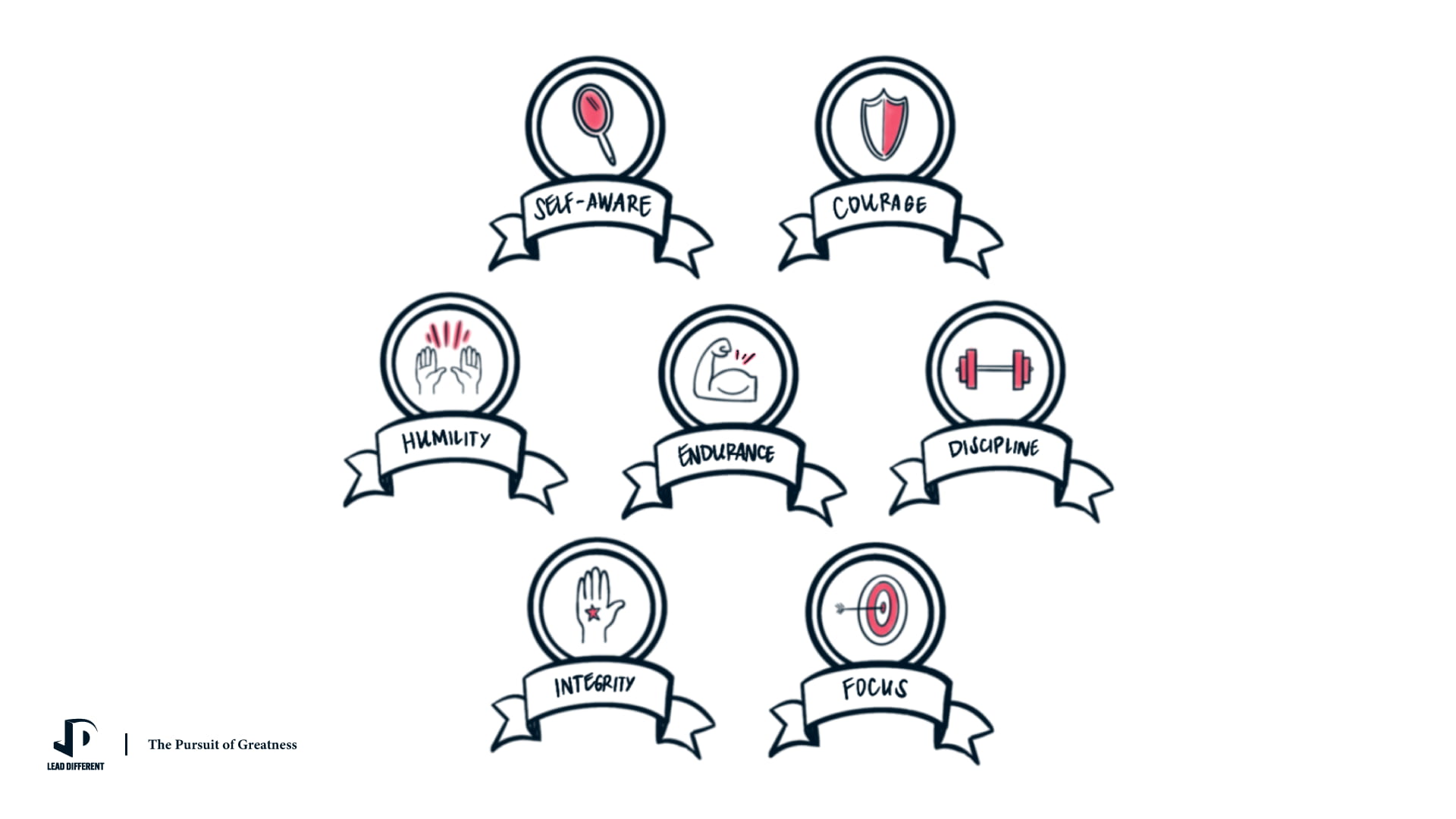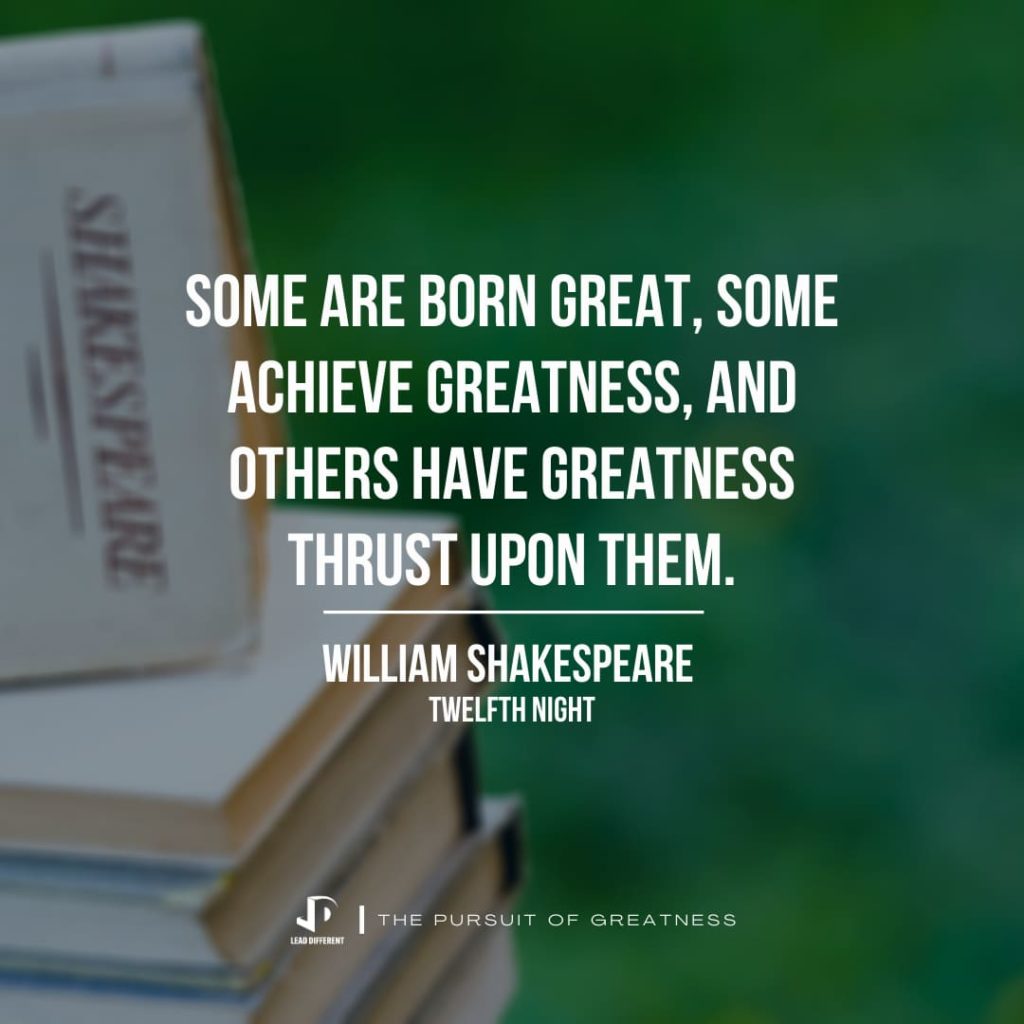
The Pursuit Of Greatness
November 20, 2020
Russ Ewell
Listen to the podcast episode based on this article entitled “The 7 Core Character Traits.”
Average is over is the catchphrase of our age, and it is likely to apply all the more to our future.
– Tyler Cowen, Average Is Over
Tyler Cowen, one of our greatest economists and thinkers, published Average is Over in 2013. His writing was an attempt to warn society about the generational change being ushered in by a technological age with an effect as staggering as any disruptive moment in history.
If you and your skills are a complement to the computer, your wage and labor market prospects are likely to be cheery. If your skills do not complement the computer, you may want to address that mismatch. Ever more people are starting to fall on one side of the divide or the other. That’s why average is over.
– Tyler Cowen, Average Is Over
Mr. Cowen’s insight has been predictive. At this moment, we are facing a global pandemic which has been disruptive and destructive to everyday life and the economy.
Federal Reserve Chairman Jerome Powell said last week that “We’re recovering, but to a different economy.” This different economy as described by Mr. Powell is the one Mr. Cowen anticipated.
A recent article by Anneken Tappe of CNN Business summarized Mr. Powell’s remarks as follows:
While technological advances are generally positive for societies over the long term, Powell said, on a short-term basis they create disruption, and as the market adjusts to the new normal the pain isn’t shared evenly.
– Anneken Tappe, “The Economy As We Knew It Might Be Over, Fed Chairman Says”
The world has and continues to change with the force of creative destruction Joseph Schumpeter discovered and taught to be an unavoidable part of capitalism. This force is at work now and Mr. Powell predicts it will continue wielding its painful impact even after the pandemic is gone:
“Even after the unemployment rate goes down and there’s a vaccine, there’s going to be a probably substantial group of workers who are going to need support as they’re finding their way in the post-pandemic economy, because it’s going to be different in some fundamental ways…”
– Jerome Powell, as quoted in “The Economy As We Knew It Might Be Over, Fed Chairman Says”
Here is a set of truths applied to many institutions. The three most powerful forces at work in our world in my view are political, economic, and religious or spiritual. When any one of these is disrupted, the other two are disrupted as well.
What does this mean for us? In the words of Tyler Cowen, “average is over,” whether we want it to be or not.
I am old enough to remember when Toys“R”Us, Circuit City, CompUSA, Blockbuster, Motorola, Sun Microsystems, and a host of other companies were vibrant parts of the economy. The only one left is Toys“R”Us, and they are trying to make a comeback after previously shuttering their stores.
What happened then can happen to any individual or organization lacking the humility to understand innovation is no longer an option but a necessity. No one is safe from the unforgiving efficiency of life. Call it creative destruction or evolution, it is not so much survival of the fittest as success to the adaptable and flexible, those humble enough to realize today’s excellence can become tomorrow’s mediocrity in years, months, and sometimes weeks.
All of this is why I believe in the pursuit of greatness, lest mediocrity infect our lives and make us obsolete and unnecessary. We must be willing to acknowledge that our resistance to change will not stop change from happening.
The Debilitating Resistance of Mediocrity
Listen to Me, you who already live out what is true and right, who treasure My instruction within your hearts: Don’t be afraid of people’s scorn. Don’t let their dismissive criticism, bitter anger, or hatred get you down.
– Isaiah 51:7 Voice

Mediocrity resists greatness. My personal definition of mediocrity is not merely “the ordinary” or “not very good.”’ These terms don’t do the potent emotional force of mediocrity justice. We don’t become mediocre because we lack talent or skill.
Mediocrity is a force, an influence. It is the debilitating voice in our head expressing dismissive criticism, bitter anger, and hatred toward ourselves. The voice of mediocrity tells us we are unworthy and inadequate. It viciously attacks us in the most personal ways, be it our appearance or our background. It drudges up our failures to remind us of the pointlessness of our pursuits and the inevitability of our failure to come.
On occasion the voice of mediocrity can be heard in the voice of people we know whose analysis labels us ‘not great,’ or others who enjoy the comfortable ease of average, choosing to criticize our pursuit of greatness because of the stress it places on their lives.
There are too many occasions to recall in which I watched people with a dream to do great things destroyed by those whose anger or envy caused them to resist by using the weapons of dismissive and destructive criticism.
One of the people who suffered through the destructive and debilitating resistance of mediocrity was my dad. He grew up in the Jim Crow era, a time when angry uneducated racists hated the idea of a talented and educated man of color doing what they could not do.
I watched my father place self-imposed limits on his potential because of the early attacks and resistance of the mediocre. He taught me through his words and life to never make the mistake of limiting myself to what the forces of mediocrity deem possible or acceptable, but to instead strive for greatness.
Everyone Can Be Great At Something
“It’s time to shift the culture, move the focus
Rise above, and lose the vultures
It’s hard to fly when those that’s close to you
Keep pulling you down, yeah
Off my chest, no more excuses
Scared to death, but I can’t lose grip of
I’m scared to jump, I’m scared to fail
I’m scared of you, I’m scared of myself”
– Kevin Ross, “Do You Wanna Be Great”
Kevin Ross, introduced to me by a close friend, sings these lyrics in his song “Do You Wanna Be Great.” He encourages us to resist the resistance of mediocrity and pursue greatness.
Mr. Ross speaks in melody to the soul of those who believe everyone can be great at something. He encourages us to resist the compromise mediocrity suggests is acceptable.
Just take my time, won’t compromise
For nobody, ’cause we can all be somebody (somebody)
Everyone can be great at something, because everyone can maximize their talents and efforts. I have seen my sons do great things by overcoming their disabilities, achieving things at one time considered impossible through their extraordinary effort. This is greatness. Yes, everyone can be great at something.

The Universal Desire For Greatness
Martin Luther King, Jr. identified the universal desire for greatness in “The Drum Major Instinct,’ a speech referenced by Barack Obama in his new presidential memoir A Promised Land:
I recalled a sermon by Dr. Martin Luther King, Jr., called “The Drum Major Instinct.” In it, he talks about how, deep down, we all want to be first, celebrated for our greatness; we all want “to lead the parade.” He goes on to point out that such selfish impulses can be reconciled by aligning that pursuit for greatness with more selfless aims.
Dr. King explores the depths of human motivation in “The Drum Major Instinct,” first by enlightening the listener as Mr. Obama suggests that “there is deep down within all of us an instinct. It’s a kind of drum major instinct—a desire to be out front, a desire to lead the parade, a desire to be first. And it is something that runs the whole gamut of life.”
Quoting the psychotherapist Sigmond Freud and Alfred Adler to explain the complex drives of man, Dr. King sides with Adler agreeing our desire for greatness is ‘the basic impulse,” the dominant human drive.
We all want to be important, to surpass others, to achieve distinction, to lead the parade. Alfred Adler, the great psychoanalyst, contends that this is the dominant impulse.
Sigmund Freud used to contend that sex was the dominant impulse, and Adler came with a new argument saying that this quest for recognition, this desire for attention, this desire for distinction is the basic impulse, the basic drive of human life, this drum major instinct.
– Dr. Martin Luther King, Jr., The Drum Major Instinct
The originating text for “The Drum Major Instinct” was found in Mark 10:35, which Dr. King returns to after resolving the conflict between Freud and Adler. He refers to the conversation between Jesus and two of his disciples, James and John, who had asked for the seat of greatness, making the point that Jesus did not admonish them for their selfish ambition, but instead refocused and redefined their ambition for greatness.
But that isn’t what Jesus did; he did something altogether different. He said in substance, “Oh, I see, you want to be first. You want to be great. You want to be important. You want to be significant. Well, you ought to be. If you’re going to be my disciple, you must be.”
But he reordered priorities. And he said, “Yes, don’t give up this instinct. It’s a good instinct if you use it right. (Yes) It’s a good instinct if you don’t distort it and pervert it. Don’t give it up. Keep feeling the need for being important. Keep feeling the need for being first. But I want you to be first in love. I want you to be first in moral excellence. I want you to be first in generosity. That is what I want you to do.”
Dr. King explained it better than I ever could when he said about Jesus, “he transformed the situation by giving a new definition of greatness.” Greatness is not a form of entitlement where we are born into it, receiving a life of undeserved privilege because of our last name, zip code, education, ethnicity, the color of our skin, or the perceived superiority of our religious beliefs.
And you know how he said it? He said, “Now brethren, I can’t give you greatness. And really, I can’t make you first.” This is what Jesus said to James and John. “You must earn it. True greatness comes not by favoritism, but by fitness.
– Dr. Martin Luther King, Jr., The Drum Major Instinct
The new definition of greatness provided by Jesus and taught by Dr. King on February 4, 1968, just 2 months before his death on April 4, 1968, was service to a cause greater than oneself, a greatness Dr. King personified and described with intellectual depth and eloquence.
And so Jesus gave us a new norm of greatness. If you want to be important—wonderful. If you want to be recognized—wonderful. If you want to be great—wonderful. But recognize that he who is greatest among you shall be your servant. That’s a new definition of greatness.
Everyone desires to be great. The only question to ask is whether it will be a greatness for self or service.
Choosing Greatness
Some are born great, some achieve greatness, and others have greatness thrust upon them.”
– William Shakespeare, Twelfth Night

William Shakespeare, through the lens of Dr. King, might be rendered, “Some are born to serve, some achieve service, and others have service thrust upon them.”
Those who are born to serve have the inclination of heart leading them to select career paths where they have the opportunity to serve others, like special education teachers, nurses, and first responders.
Those who achieve service are those who change course from selfish and popular pursuits, purify their motives, mature their character, and become someone different than expected.
Finally, there are those who are not born with an inclination to serve, nor do they experience a transformation leading them to achieve service. These resist service until a moment comes where service is thrust upon them.
Personally, I was born to selfishness, worked to achieve success for myself, until service was thrust upon me. It all began with a set of conversations.
During my freshman year of college, an English professor challenged me to seek depth in my writing and reading, something which exposed the superficiality of my life. The next year, the same English professor saw me on campus and asked me what I had read and considered over summer break.
When I told him that I had discovered my new philosophy of life, he asked what it was, then I told him Ayn Rand. His response was, “Ayn Rand? She is a racist and fascist!” At the time, I probably could have lived with the fascist part, but the racist element was a bit of a dealbreaker.
Barely nineteen years old and in possession of a fragile intellectual confidence, this last conversation devastated me, not personally, but intellectually. All at once, I realized my instincts were wrong. I made a decision to take my first religion class. This class did little except bore me, but the people and conversations in and outside of class forced me to consider spirituality for the first time.
My eyes were being opened intellectually, spiritually, and as a consequence my emotional armor was pierced. I was awakening to a reality unfamiliar: that people mattered. Not just friends, but people in general – people in need, people in pain, people without opportunity, and in this moment of illumination the weight of societal injustice stirred my soul (not only then, but at various stages in my life as I saw suffering, which became most personal when I became a parent of children with disabilities).
This piercing opened the door for me to consider intellectual disciplines and careers of service. Instead of resisting this transformation of purpose I embraced it, concluding that all along I had been a people person, a person meant to serve but derailed and disrupted on this journey by insecurities and fears of rejection. The unfettered growth of selfishness in my life had made it impossible for compassion to bloom.
Little did I know at this moment I was choosing greatness. My journey would be difficult, humbling, inspiring, fulfilling, overwhelming to the point where I considered abandoning the pursuit of service, until refined and molded service became my desire rather than a behavior.
The Pursuit of Greatness
Greatness or the excellence of effort on behalf of a noble cause is my desire. Writing in this space, it is my hope to convince others to join me on the journey. This pursuit of greatness is less about accolades and more about action, specifically, the intentional development of a character shaped for service from the inside out.
In my experience, there are seven core character traits necessary to not only pursue but achieve the greatness of service. I expand on these in the attached Russ Off The Cuff Podcast. They are as follows.
- Self-Awareness
- Courage
- Humility
- Endurance
- Discipline
- Integrity
- Focus
By no means do I consider myself great. What I believe is I am in pursuit of greatness, first by maturing my character, then by pursuing purpose and fulfilling my destiny. This happens when, like my English professor, I pass on to others what I have received: the opportunity to live a life of true service, which is about making others great not yourself.

